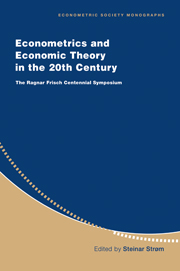Book contents
- Frontmatter
- PART I RAGNAR FRISCH AND HIS CONTRIBUTIONS TO ECONOMICS
- PART II UTILITY MEASUREMENT
- PART III PRODUCTION THEORY
- PART IV MICROECONOMIC POLICY
- 8 Evaluating the Welfare State
- 9 Frisch, Hotelling, and the Marginal-Cost Pricing Controversy
- PART V ECONOMETRIC METHODS
- PART VI MACRODYNAMICS
- PART VII MACROECONOMIC PLANNING
- Author Index
- Subject Index
8 - Evaluating the Welfare State
from PART IV - MICROECONOMIC POLICY
Published online by Cambridge University Press: 05 January 2013
- Frontmatter
- PART I RAGNAR FRISCH AND HIS CONTRIBUTIONS TO ECONOMICS
- PART II UTILITY MEASUREMENT
- PART III PRODUCTION THEORY
- PART IV MICROECONOMIC POLICY
- 8 Evaluating the Welfare State
- 9 Frisch, Hotelling, and the Marginal-Cost Pricing Controversy
- PART V ECONOMETRIC METHODS
- PART VI MACRODYNAMICS
- PART VII MACROECONOMIC PLANNING
- Author Index
- Subject Index
Summary
Ragnar Frisch was a leading advocate of national economic planning in the service of the welfare state. His Nobel lecture (1970) stressed the value of interactions between economists and politicians in arriving at politically acceptable and economically viable national plans. A major theme of his lecture was that economists should act in the public interest and in so doing should recognize the diversity of policy objectives advocated by different groups in democratic societies. He made the important distinction between maximizing the mythical welfare function assumed in classical welfare economics and in the classic policy analysis of Tinbergen (1956) and reconciling and satisfying the diverse perceptions and values held by citizens of modern states. He stressed the role of economists in informing policy-makers and the general public about the relevant economic trade-offs and the costs of alternative policies.
Frisch's faith in the power of economics to supply the information required to make informed public choices seems wildly optimistic today, yet his message remains relevant. Economists are still asked to inform the general public and policy-makers about the likely consequences of alternative social programs. Social-welfare functions do not govern decision making in any democratic society, and it is clear that a variety of criteria are relevant for evaluating alternative policies in democratic societies composed of individuals and groups with diverse values and perspectives.
- Type
- Chapter
- Information
- Econometrics and Economic Theory in the 20th CenturyThe Ragnar Frisch Centennial Symposium, pp. 241 - 318Publisher: Cambridge University PressPrint publication year: 1999
- 6
- Cited by



